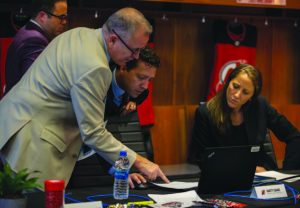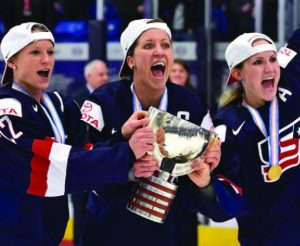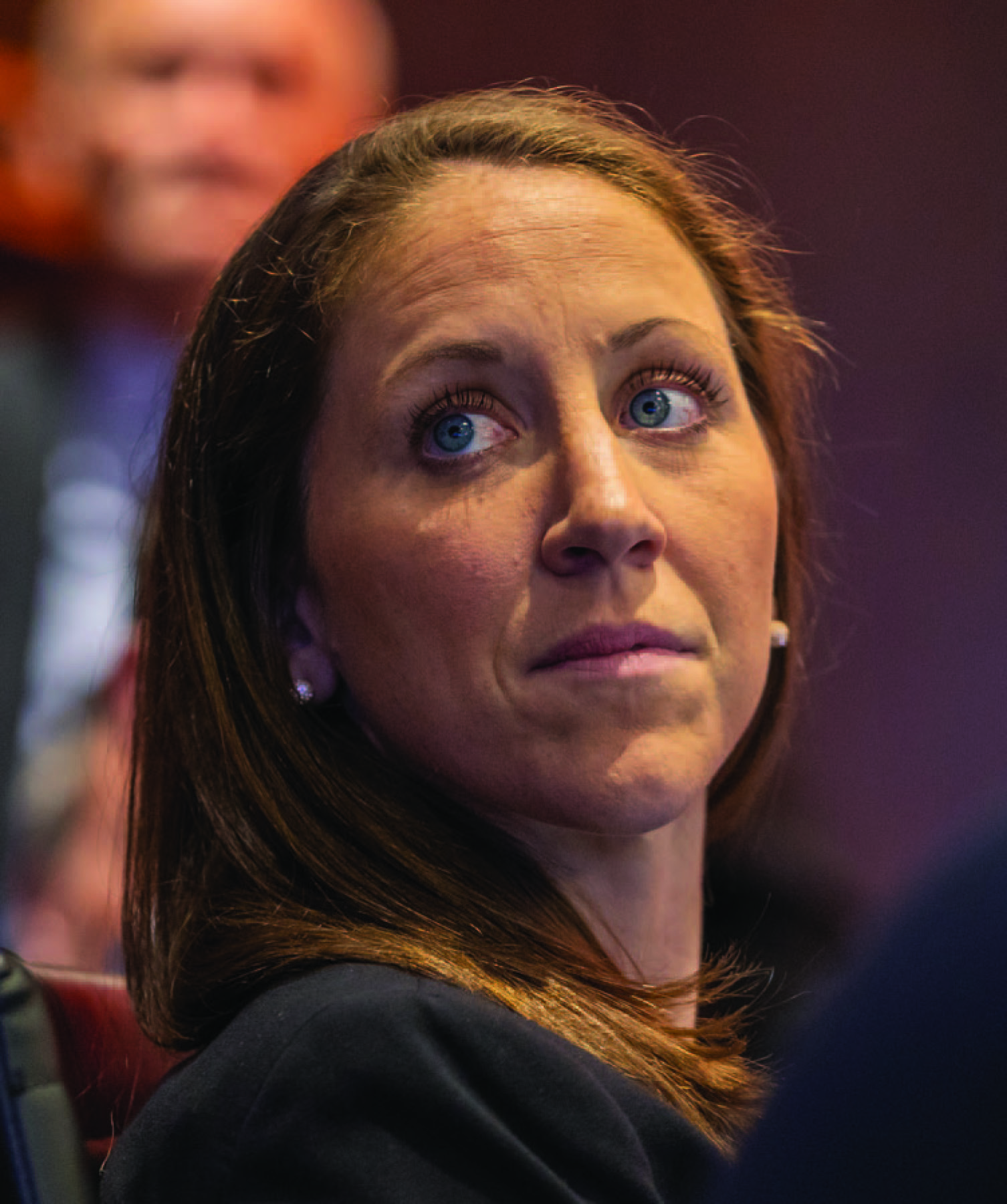Remember when you played sports in school and there was that one kid on the other team who made you want to take a seat on the bench? You know…an athlete who saw things a split-second sooner, who was a step quicker, and who administered a hard lesson in physics if you were foolish enough to make contact. Meghan Duggan was that kid. She grew up to become captain of the U.S. women’s ice hockey team, which, after silver medals at the 2010 and 2014 Olympics, won a gold medal in 2018 in South Korea. After 13 years at the apex of her sport, Duggan hung up her skates, moved to New Jersey and, last spring, became Manager of Player Development for the New Jersey Devils. A new mom in a new job, she brings her leadership, hockey experience and keen eye for championship intangibles to a club looking to hang a fourth Stanley Cup banner from the rafters at the Prudential Center. No pressure, right? EDGE caught up with Meghan to talk about life on her new home ice.

Andrew MacLean/New Jersey Devils
EDGE: Sports fans don’t realize what’s involved in the transition from star player to team executive. For some, it’s a natural transition, for others not so much. What has been the easiest part for you these past six months or so?
MEGHAN DUGGAN: The easiest part of the transition is coming into a culture that’s based around what I’ve built my life around, the sport of hockey. I’m working with hockey minds and that “hockey family” mentality, which I love. There are a lot of people in the Devils organization, and pretty much everyone with whom I interact on a daily basis has played at a high level and was a leader at a high level. I’ve felt welcomed since day one.
EDGE: What has been the most challenging aspect?
MD: Continuing to learn the ins and outs of building a successful NHL team. For a long time, I’d just had to focus on playing and leading a team as an athlete. Now I am digesting and understanding all of those components in a short period of time, including development, analytics, amateur scouting, pro scouting— just learning the terminology and how all the different groups work together toward the same goal—so that I can add value in the best way possible.
EDGE: Having been the captain of a successful team, does that give you a sixth sense about young players who might bring a similar quality to the Devils?
MD: Filling that role for so long, having to go through different experiences and highs and lows, it shaped me as a person and the leader that I wanted to be. I was challenged many times and learned a lot about having the will and the drive to compete. Using what I learned as a captain to identify and help develop great leaders and great culture is something that I want to bring to the Devils.

U.S. Women’s National Hockey Team
EDGE: With the women’s national team, you often found yourself advocating for financial support and better conditions. Is it a relief to be working for a team where those challenges don’t exist?
MD: You know, every situation brings its own challenges. On the women’s side, something that we’ll always continue to fight for is visibility, accessibility and resources. In the NHL, there certainly aren’t those struggles, but we have our own set of hurdles to clear. In both cases, that’s what you have a team for, and why you need a great group of people strategizing and solving problems. But advocacy is always going to be a part of me. Sports has given me so much in my life, I am always passionate about advocating for kids to be involved in sports and around sports, and to have great role models in general. I was recently named president of the Women’s Sports Foundation for 2022. I’m really looking forward to finding ways to marry my two roles, generating excitement about the Devils among young girls and women, and getting them to games here in New Jersey.
EDGE: I am curious about your thoughts on something. I believe that American sports fans don’t quite know how to process a silver medal, particularly in a team sport. What was it like to win silver twice and how did winning gold in 2018 alter that perspective?

Upper Case Editorial
MD: That’s a good question because the way you think about it does change and evolve. As an Olympic athlete, and a hockey player specifically, all the training I did in the four years leading up to the 2010 and 2014 games—and then winning the silver both times—there was a little sting at the beginning, as you might imagine. You don’t train and prepare and do everything you do for second place. You’re not running on the treadmill ’til exhaustion thinking I can’t wait to win silver. In hockey, in order to win a silver medal, you have to lose in the final game. So as competitive as I am and our teams were, it’s tough to swallow at first; it takes a little time to get over that and adjust. But when you are able to step back and reflect on the journey and the process and the lives you touched on the way there—and what it does mean to bring a silver medal back to your country—you can be proud of it.
EDGE: So what happened between 2014 and 2018?
MD: Our team really transformed and took on the challenge of becoming something bigger, becoming something more than silver, figuring out what the missing piece was to get the gold medal. We worked hard for four years and lived by the motto You can’t stay the same and expect a different result. We had to dig a little deeper and we were able to do so. I am very proud of our team for winning the gold medal—and then how, as a group, we used that gold medal for advocacy work, as well.
EDGE: How would you describe Meghan Duggan as a player when you were at your best?

U.S. Women’s National Hockey Team
MD: I’ve been a really competitive person since I was young. I’ve always held myself to the highest standards when it comes to competing and work ethic and the will to do the little things to help my team—win battles, block shots, kill penalties, go to the dirty areas to score goals—so I definitely brought those elements to my game. When I was at my highest level, I was a high goal-scorer and point producer. But as you get older and younger players come in, you turn your identity into something different. I was always a physical player who protected my teammates, created havoc, brought energy and was a really hard player to play against. To be honest, those are qualities I admire and look for in a player in this day and age. It’s not something everyone has, and it’s not something you can pull out of a player. It’s something deep inside players who I find exciting to be around and watch.
EDGE: What’s it like playing on a line where everything clicks?
MD: It’s the best. I had that multiple times in my career. Every night you’re showing up and your line is putting up three, four goals and you’re on a roll. It’s a nice feeling when you find that chemistry. On the flip side, being able to work through the adversity when that’s not happening—I think great players do that.
EDGE: Is that a coaching thing or something the players work out themselves?
MD: It’s a combination. There’s a lot that goes into it, which is something we deal with on the development side with the Devils. You’re trying to develop players from a technical, tactical, mental and physical perspective. However, as a player, when things aren’t going well, you have to be able to evaluate all of those components of your game, too, and find your way out of it.
EDGE: When you were growing up, playing youth hockey in Massachusetts, the American women’s team won the gold medal in Nagano. How did that change your life?
MD: My teammates and I have always said that the 1998 women’s team lit a fire in us. It really did change my life because, growing up, I had idolized NHL players. I thought I’d go on to play in the NHL, because that’s all that I saw. Being able to experience women playing hockey at an elite level was life-changing for me. And then having the opportunity to meet some of them, to put their gold medal on, to put their jersey on, that was pretty special for a 10-year-old kid. From that moment, I told everyone I knew that I was going to play in the Olympics and captain the team to a gold medal. I built my life around it.
EDGE: At what point did you feel like you were being groomed for the national team?
MD: During my freshman season in college at the University of Wisconsin, when I was invited to compete at the training camp for the women’s national team, right after Christmas. From that camp I made the World Championship team in the spring. After that, I stayed on the team for 13 years, until I retired a couple of years ago.
EDGE: You’ve talked about what you like to see in a player. Are you going to be doing a lot of scouting in your role with the Devils?
MD: That’s a major component of my job. Our department has to understand how the young players we’ve drafted or the young pros on the team or the prospects out in the field are developing, and then give them the resources to enable them to become the best players they can be.
EDGE: Is there a “Devils kind of player” that the team looks for?
MD: When you think about what the end goal is, for the organization to win a Stanley Cup, it’s more about finding the pieces that fit together in a great puzzle in order to do that. And there are a lot of pieces: your high-skilled players, your energy players, your identity players, your players who will go through walls, your goal-scorers. The Devils are very well organized. The way we go through discussions and challenge each other to be the best we can be, it’s very exciting to be a part of that. We have dynamic leadership in Tom Fitzgerald, our general manager. I’ve already learned a lot from him. As for my role, I interact with a lot of different groups within the organization. I’m in on the hockey-specific stuff and understand how players are playing right now, and where they are physically. I also have to understand who are the amateur players who might potentially be drafted and fall into the hands of the development group. So I’m still learning, but that’s what I love about my job—it gives me a unique opportunity to see how the organization runs from a number of different scopes.
EDGE: You have two very young children, so you probably get asked a lot whether you’ve gotten them on the ice yet?
MD: My son will be two at the end of February. We got him out on the ice once last winter at 10 months and I look forward to getting him on skates this winter. My daughter was born this fall and we’ll definitely be getting her on skates, as well.
EDGE: Are they looking like forwards or defensemen at this point?
MD: Too early to tell. But we’ll support them either way. I don’t know that I’d be a great goalie parent, though. I think I’d be too nervous to even watch the game. So we’ll steer ’em away from that [laughs]. We’ll see. EDGE
Editor’s Note: Meghan Duggan is an iconic figure in the history of women’s ice hockey. She was a First-Team All-American and the NCAA’s top scorer in 2010–11, and won multiple honors as the top player in women’s college hockey that season. She played six years of pro hockey following her graduation from the University of Wisconsin-Madison with a degree in Biology. In her eight career trips to the World Championships, Duggan and her U.S. teammates won seven gold medals.











